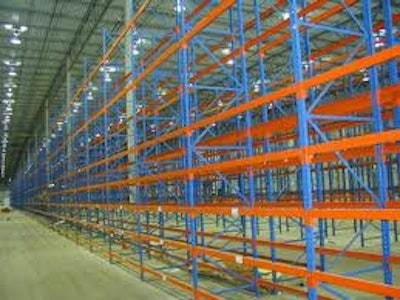
You would think if there was anything you could purchase “off the shelf,” it would be shelving. After all, it’s not like an automated conveyor or a security system that has to be specified, designed and configured to match the area in which it will be installed.
Shelving is just vertical pillars with horizontal planks between them. Right? You just figure out the height, length, depth - and maybe the color - and then you place the order online.
It might work that way for your garage. But when it comes to your business, it’s not quite that simple. There is much more to consider, in terms of utility, safety, and even aesthetics. And if you don’t know the answers to the questions you could end up making some costly mistakes. Which is why you want to work with an online store that offers engineering assistance in addition to a nice graphic interface and easy checkout.
Following are six points to consider before placing your next industrial steel shelving order.
- How much weight the shelves have to hold. The weight ratings on shelving can be very misleading, because they’re based on the load being distributed evenly across the shelf. In other words, a 400 lb. capacity rating means a non-reinforced shelf will be much better at storing 10 items of 40 lbs. each spread across the surface than one 400 lb. item sitting in the middle. You can test that by stepping in the middle of 400 lb. capacity shelf and watching it bend, despite the fact that (hopefully) you don’t weigh anywhere near 400 lbs. An industrial supplier that offers engineering assistance will be able to talk through how you plan to use the shelving, along with factors such as whether employees will be climbing on them even though the warning signs specifically tell them not to, and help you determine the right capacity choice.
- Match custom shelving to what will be stored – and the room. Sometimes the simple math can be deceiving. Take product size for example. If you plan to store 12 inch wide boxes three across, simple math tells you that you need a 36 inch wide shelf. Yet the reality is this configuration will be such a tight fit that you’ll have trouble moving them in and out. A couple of extra inches will likely make a significant impact on productivity and safety. Then there’s shelving height. If your ceilings are eight feet high, you might be tempted to purchase 96 inch high shelves. Yet you’ll be paying more than you need to, because you won’t be able to store anything on top. You’ll also run the risk of running into a lighting fixture, pipe, sprinkler or other object on the ceiling. An 84 to 88 inch high shelving unit will probably hold just as much product while saving you money and increasing your placement options.
- Consider ordering stock sizes. Shelving is often stocked in several common sizes. If you need to set up an area quickly, you might want to consider what is available in-stock rather than ordering custom lengths or heights. Normal standard sizes (in inches) are 18 x 36, 18 x 48, 24 x 36 and 24 x 48. The heights will usually vary from 72” to 96” nominal. Just be sure to keep Tips #1 and #2 in mind when placing your order – again, good reasons to work with a supplier that has engineers available to answer questions.
- The size is not always the size. Most shelving is measured with what is known as nominal dimensions. Literally, nominal means “in name only.” In the real world, it means that a shelf listed as being 36” wide may only be 35-7/8” or 35-3/4” or some other dimension. That can complicate things if you decide to add on to your existing shelves later only to find that the dimensions of the new shelves don’t exactly match those of your current ones. In some cases you may have to run through several manufacturers before you find one that is even a close fit. To avoid these issues, it is best to document which manufacturer you’re purchasing from so you know where to go in the future. Which brings us to…
- Purchase from known, reputable shelving companies. Manufacturing shelving requires a large investment in equipment, space and engineering. Yet it is also an intensely competitive business, which makes it difficult for suppliers without deep resources and other lines of business to operate profitably. As a result, many shelving manufacturers come and go – which means it could be difficult to match the shelves you purchase today three, five or 10 years from now. You want to work with a U.S.-based company with a good reputation, extensive engineering resources and longevity in the industry. Otherwise, short-term savings could turn into a long-term headache.
- Choosing colors. Most shelving companies will supply shelving in several standard colors. But those colors can vary even within goods from the same company, and most likely won’t match at all between companies. So while there may be good reasons to liven up the storage area or reinforce your corporate branding with pleasing colors today, you may find it difficult to match those colors down the road. Some manufacturers will offer to paint shelves in custom colors, but you can expect to pay a premium for them so have to determine whether the effect you’re trying to achieve is worth the upcharge. While it may not be exciting, your safest choice is standard industrial gray. It’s unlikely anyone will care if they match exactly.
Getting the right shelving is more than a matter of doing an online search and finding the cheapest price. For safety, for performance and for aesthetics, it really does pay to look beyond the “off the shelf” solution.
Don DeSimone is Director of Warehouse Equipment Sales, and an industry veteran with over 30 years of experience in materials handling equipment. He specializes in industrial shelving and cranes for WarehouseEquipmentStore.com, the on-line store of Wynright Corporation, the nation’s leading independent, U.S.-based provider of intelligent material handling systems. The company designs, manufactures, integrates and installs the full spectrum of intralogistics solutions, offering both Wynright branded and third-party equipment to meet customer needs. Don can be reached at [email protected].






















